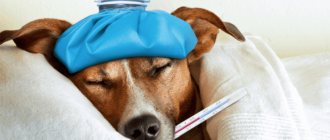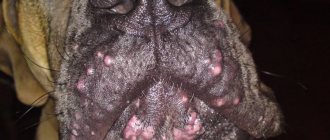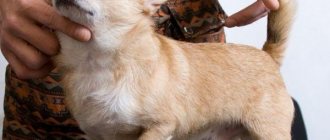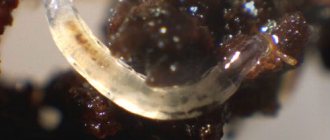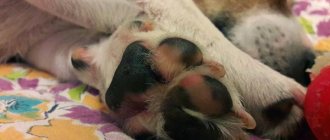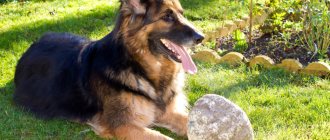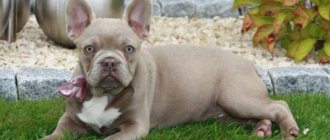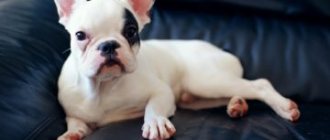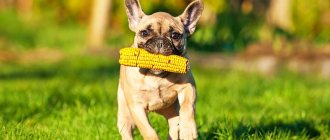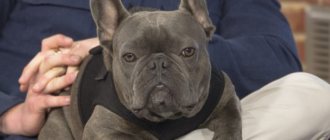The French Bulldog is a selectively bred breed, so they are more susceptible to various diseases than other dog breeds. Probably only pugs are ahead of them in terms of the number of diseases. They have a number of specific characteristics and hereditary predispositions that are unique to them.
The most common are problems with the spine, skin, paws and eyes. Mostly, pathologies begin to appear after 5–6 years of a dog’s life, but they can appear earlier. The fundamental principle of diagnosis here is immediate contact with a veterinarian, since self-diagnosis, and especially treatment, can lead to the most disastrous consequences.
If any signs of illness appear in your dog, you should contact your veterinarian for tests, a diagnosis and treatment.
How can you tell if your dog is sick?
First of all, you should pay attention to the dog’s atypical behavior. She may start to worry and whine. Also refuses to eat or sleeps poorly. These are all signs of a malfunction of the body. Particular attention should be paid to the French bulldog puppy. The puppy should be quite vigorous and active, cheerful and playful. He should not have excessive discharge from his eyes or nose, they should be clean.
If the “baby” is lethargic and apathetic, his nose is dry and hot, this is the first sign of an incipient illness. First of all, you need to measure the temperature. It is measured by inserting a thermometer into the dog's rectum. A normal temperature is considered to be between 38 and 39 °C. Even a slight deviation of half a degree indicates the presence of a serious disease. This requires the intervention of a qualified veterinarian. Further in the article, the main signs and types of ailments that the owner of a French bulldog may encounter will be discussed.
Briefly about the breed
Do you want to get a French bulldog?
Yes
48.39%
While I'm thinking
27.42%
Has already!
24.19%
The French Bulldog is a strong, muscular, medium-sized dog. She is recognized by her erect ears, symmetrical folds on her muzzle, flattened nose and large, slightly protruding eyes.
Initially, the French bulldog was used for catching rats and baiting bulls, but due to its nature, it gradually became a decorative dog, a “pet for the soul.” Many people fall in love with a dog with big eyes at first sight. However, there is a lot of conflicting information about the breed.
To understand whether it is worth getting a French bulldog, you need to weigh the advantages and disadvantages of the breed, and your willingness to devote 10-12 years of your life to a new family member.
Dermatitis
Dermatitis is an inflammation of the skin caused by the presence of an allergen. French bulldogs have a low immune threshold and they are prone to a strong reaction of the body to any irritants. The most common is atopic dermatitis. It is visible on the dog, and she gives it away by constant scratching. It is characterized by inflammation and rashes in certain areas of the skin, the appearance of blisters on the abdomen, between the fingers, and on the testicles.
Light-colored dogs are more likely to suffer from skin diseases, so they require more careful hygiene.
Character traits
The character of the French Bulldog is very friendly, loving, and playful. He is easy to train. The bulldog senses the mood of its owner well. A dog can talk and remain silent with a person. In their reviews, owners compare French bulldogs to cats - affectionate and gentle. In addition, Frenchies (also called bulldogs) get along well with children and are ready to play with them indefinitely.
At home, bulldogs are everywhere and aware of all events. They must “help” each family member in whatever activity he or she is doing at a particular moment. It is important for a Bulldog to be the center of attention and accompany its owner everywhere.
The Frenchie is a true companion dog. At the same time, this breed is not for everyone. French bulldogs are famous fighters. The size of the enemy is not important. On the contrary, the larger, the greater the excitement. The bulldog hangs on the opponent with a strong grip and is very difficult to remove.
The Frenchman does not float well on the water, but their character is such that they are always confident in their abilities. Therefore, if they want, they can even enter a raging river.
The activity of a bulldog is a plus for some, but a minus for others. If a person needs peace of mind and relaxation, then perhaps it is worth getting a dog with a calmer temperament. However, not every breed can give so much emotion and positivity. That's why single people often get Frenchies.
Advantages and disadvantages
Balanced and friendly character.
Loving, affectionate.
Suitable for families with children and single people.
Excessive independence.
Aggression in certain representatives of the breed towards other dogs.
Allergy
Skin diseases are easy to treat, but problems arise when self-diagnosing and determining what exactly causes dermatitis. A veterinarian's consultation is required here. Characteristic symptoms include the following:
- Restless behavior.
- Skin rash.
- Partial hair loss.
- Red spots and swelling.
- Edema.
- The appearance of pustules, ulcers and wounds on the body.
- Constantly itches.
- Heavy breathing and constant sneezing.
In addition to the body and head, the pads on the paws, the interdigital area and the entire length of the claws are also affected. Next, you can familiarize yourself with the different types of allergies.
Food
Photo of allergy manifestations
The dog may feel sick, refuse to eat, and have diarrhea. The way to combat this is to review foods from the diet and eliminate them one by one until the source of the allergen is identified. Itching is relieved with special tablets and ointments, drops are placed in the eyes and wiped with lotion.
Signs of a food allergy may include:
- The appearance of red spots on the skin.
- Itching.
- Dandruff rash.
- Edema.
- Teariness and redness of the eyes.
- Inflammation of the mucous membranes.
- Irritable or depressed behavior.
Medication
Taking medications by your pet during treatment may cause the body to have an allergic reaction to the tablets. It is also possible that the dog accidentally found and ate medications.
Chemical
Inappropriate cosmetic and hygiene products, low-quality and allergenic shampoos, all this leads to the risk of allergies. It is necessary to periodically do wet cleaning and ventilate the room.
On parasites
Parasites are very dangerous to the health of not only dogs, but also people who are in close contact with them . The bulldog's resting area must be kept clean, bowls must be washed regularly using various detergents, food and water must be of good quality. In this case, the possibility of infection by parasites is very small. External parasites (ectoparasites) usually live on the dog's skin and fur. There are several types:
- Fleas.
- Lice.
- Ticks.
The bulldog begins to itch constantly and becomes nervous and aggressive. Sores, redness on the skin and bald spots in the fur appear on the body. Fleas bite your dog and make him itch. She begins to chew the base of her tail. As a result, by ingesting fleas and scraps of fur, she can become infected with tapeworms. A clear sign of an infestation is the presence of “flea dirt” (grainy black growths) in the fur.
Fleas can live not only on the dog, but also in the house. The dog needs to be treated with insecticidal preparations and the house must be thoroughly cleaned. Lice are harmful not only to dogs, but also to humans. They are contagious and clearly visible on the body. You can get rid of them using insecticidal shampoo, but it is still better to consult a doctor for advice.
Ticks are divided into 3 types:
- Demodex.
- Sarcoptes.
- Encephalitis.
The first two cause scabies. Demodex is extremely contagious and can only be detected under a microscope. Lives in hair follicles. The mite moves in the upper layers of the skin, causing itching. The dog begins to itch, its hair falls out and wounds appear on its body. The encephalitis tick is visible to the naked eye.
The bite does not cause irritation and is imperceptible to the pet. The danger is that it is a carrier of diseases. Therefore, after walks, especially in the forest, it is necessary to check the dog for ticks, especially on the ears and between the hind legs. Having found a parasite, you need to drip medical alcohol or sunflower oil on it and remove it with tweezers.
Fungus
Fungal diseases can appear on any part of a bulldog's body. This is mainly due to reduced immunity, as well as thin and delicate skin. Careful care is primarily required in the folds of the skin, where dust and dirt usually accumulate. They need to be wiped with cotton pads or a soft cloth moistened with hygiene lotion or clean water. It is not possible to identify such a lesion on your own. To do this, the clinic takes scrapings and examines them under a microscope. The main signs of the onset of the disease are:
- Redness on the skin, the appearance of acne.
- Hair loss.
- The appearance of an unpleasant odor.
- The dog begins to itch a lot.
- Ringworm on the body.
Treatment in these cases is carried out with ointments, anti-fungal tablets, and washing the dog’s body with hygienic shampoos. In any case, it is better to consult a veterinarian.
Fungal diseases are very similar in symptoms to allergies, but treatment methods are different.
What are the most common health problems?
There can be many causes of illness in a French bulldog, especially if its health is not constantly monitored. Monitor your pet more carefully and do not let even the most minor health problems, as you think, take their course.
Dermatitis
French Bulldogs are known allergy sufferers. Almost anything can cause an allergic reaction in them, since the breed has a low immune threshold and is prone to a strong reaction of the body to an irritant.
The main symptoms of allergies can be quite varied, but the main one among them is atopic dermatitis , which manifests itself in almost all cases.
Dermatitis is an inflammatory skin reaction to an allergen. In dogs, it manifests itself in the form of rashes, inflammation in certain areas of the skin and purulent blisters on the least protected skin (for example, the testicles, skin on the stomach and between the toes).
Most often, dermatitis is visible on the dog, but it is even more likely to show it with constant scratching and restlessness. Due to severe itching, the bulldog may scratch himself in an attempt to itch, which only worsens his situation with pain and the risk of introducing an infection into the blood.
There are less common allergy symptoms - eating disorders. A French Bulldog may refuse to eat, may vomit and have diarrhea. In any case, it is necessary to pay attention to such a reaction of the body, whatever the reason.
Possible causes of dermatitis:
- the dog is allergic to food - in this case, review its diet, eliminating foods one by one to identify the allergen;
- drug rejection. If your pet has recently undergone any treatment, then the cause of the allergic reaction may be due to the medications;
- The dog accidentally swallowed substances that were dangerous to itself. These are household chemicals, hard-to-digest products, junk food not intended for dogs and full of preservatives and dyes;
- The bulldog was bitten by contagious parasites. Dog parasites often carry diseases. Carefully inspect your dog for bites and apply preventive insect repellent ointment;
- congenital allergy. Like people, French bulldogs are often born with allergies to certain environmental factors - dust, fluff and pollen of certain plants, etc.
NOTE!
The only way to cure dermatitis in a dog is to eliminate the allergen, first identifying it quickly. If the allergy is seasonal and the allergen cannot be removed, buy your dog special medications that alleviate the symptoms. Veterinary ointments will help with itchy wounds and skin areas.
Musculoskeletal disorders
The body constitution of French bulldogs implies the development of such problems in any case, especially if the dog is aged - then the chances double or triple.
How quickly your French Bulldog begins to have difficulty walking is up to you.
The dog needs:
- moderate physical activity;
- a complete diet with phosphorus and calcium;
- maintaining normal body weight.
Arthritis and osteochondrosis are the most common diseases of this type in bulldogs. Low withers and widely spaced paws create ideal conditions for the development of problems with the musculoskeletal system.
If you do everything right, your dog will encounter such problems in old age. We can only help by preventing further complications and critical periods.
Prevention includes improving the diet, removing any stress from the dog, and taking bone-strengthening medications.
In irreversible cases (disability or borderline disability), the dog can be given a prosthetic wheelchair to facilitate movement.
The prosthetic wheelchair is the most popular because it is designed for the back legs, which are usually the first to fail in French bulldogs. Unfortunately, not every clinic can make such a device for your pet.
Hind leg failure
The French Bulldog seems to become significantly lower in the spine from the withers to the tail. This structure is very inconvenient in the long term and causes a lot of problems for the dog in old age or even adulthood.
Due to a low seating position, pressure on the spine increases, spinal disc dystrophy and various forms of arthritis develop.
If at first only the vertebral discs are affected, then over time they are completely erased and the animal loses the ability to control its hind legs. The effect is similar to a spinal injury and is also irreversible.
Arthritis, if it does not deprive the dog of the ability to lean on its hind legs, makes it unbearable due to pain in the bones. The bulldog stops moving of its own accord, fearing pain. The best solution in this situation is prosthetics in combination with analgesics and dietary nutrition to avoid obesity.
Heart diseases
In small breed dogs, heart problems almost always turn out to be problems with the mitral valve .
Mitral valve insufficiency is very easy to determine - the dog gets tired very quickly, becomes out of breath, and may even faint. When you try to feel the pulse, you will find a serious arrhythmia.
To diagnose the problem, you can contact a modern veterinary clinic, where your pet will have a chest x-ray, cardiogram and ultrasound cardiography. This is enough to accurately understand the cause of the deficiency.
In such cases, veterinarians advise eliminating nitrates from the animal’s diet as much as possible, and also prescribing heart-strengthening medications - medications keep the weak heart muscle in working condition.
Red and watery eyes
If your French Bulldog's eyes are red or watery, this could indicate an infection, recent eye injury, or a progressive vision problem in the dog.
When infected, the dog will try to scratch the eye with its paw, will become restless and whine, and blink frequently. In such cases, the eye should be carefully rinsed; if this does not help, take it to the veterinarian. It is possible that a foreign object has entered the eye.
IMPORTANT!
The infection can be very dangerous - an inflammatory process begins in the eye, which, if neglected, can deprive the animal of its vision.
If the dog does not itch, then injury may be suspected. Look into the eye and look for a bruise there - if there is one, then the bulldog most likely hit his eye on something.
Vision problems are not as easy to detect as previous health problems. Usually, the owner visually notices eye diseases (cataracts, retinal detachment) too late, already in the presence of “sores” and cloudy membranes of the eye. Tearing may be a symptom.
Scabies
The first thing to do if your pet itches intensely and incessantly is to check the house for parasites. Fleas, lice, bedbugs - all these blood-sucking insects transmit infection to pets. Short-haired, squat and not very fast, the French Bulldog will be an easy target for insects.
Carry out pest control in the house, and thoroughly rid the animal of pests using tablets, gels, special collars and a good bath with special shampoo. If after this the scabies do not stop, then the cause is dermatitis.
Dermatitis as an allergic reaction is treated by eliminating the irritant. Simply remove the allergen factor and over time the dog’s symptoms will disappear.
There is also a worse option - your pet could become infected with real scabies (an infectious dermatological disease) or shingles from another animal or simply on the street.
In this case, the bulldog must be urgently taken to the veterinarian for treatment. If there are other animals in the house, they will have to be isolated.
Severe hair loss
If your French bulldog loses hair outside of periods of natural, seasonal shedding (spring and autumn), or moments of age-related changes (puppies change color quickly and with hair loss, old dogs - simply due to deterioration in the quality of wool with age), then there are reasons for enough worry.
A dog may shed when it does not receive enough nutrients for the body to function properly. When there is a calorie or nutrient deficiency, preserving the coat is not a priority, so it actively falls out, being replaced very slowly with a new one or not being replaced at all.
It could also be due to an allergy you already know.
NOTE!
If your French Bulldog gets everything he needs from food, but still sheds a lot, then it may be due to intestinal helminth parasites, due to which the animal does not receive the nutrients fully.
There may be a genetic predisposition to shedding - this is similar to the human tendency to go bald.
Diarrhea
Diarrhea is an unnatural condition of stool for almost any creature. This indicates an intestinal disorder, harms the dog in every possible way, causes severe gas production and irritates the animal’s anus.
Diarrhea can be either a one-time incident - the dog ate something wrong or picked up garbage on the street, or chronic - the result of some disease or long-term poisoning, allergies.
In the first case, you shouldn't worry too much. Put the dog on a daily diet (do not give the product that allegedly poisoned the animal) and reduce the amount of food for the next two days.
Chronic diarrhea should not be treated so lightly - it is better to take your dog to the veterinarian and find out what is so upsetting its intestines.
Snore
Due to the flattened shape of their muzzle, French bulldogs (and indeed all bulldogs), as well as sometimes Pekingese, pugs and boxers, snore. This is the norm for this breed and there is no need to worry about this - these are the features of the respiratory system of these dogs.
Another thing is when snoring is interrupted by whistling, and the dog itself is obviously having a hard time and restlessness in its sleep. It is also worth paying attention to the fact that your pet snores if, while awake, the dog also chokes and wheezes.
All of these symptoms may indicate an abnormally shaped nasal septum or brachycephalic syndrome.
Considering the problems of such dogs, veterinary clinics have long been performing nose correction operations on them. After such an operation, the dog can breathe almost fully, and its condition improves significantly.
Severe hair loss
Natural hair loss in a dog occurs during seasonal molting, or during the period of age-related changes in the puppy. In older dogs, this may occur due to the deterioration of coat quality with increasing age. Any other excessive shedding should alert the dog owner. There may be several reasons for this:
- Lack of vitamins and nutrients in the body.
- Intestinal parasites are helminths.
- Genetic predisposition to shedding.
- Allergy.
In any case, to identify the cause and prescribe treatment, consultation with a professional is required.
Red and watery eyes
Redness and tearing of the eyes can be caused by 3 reasons.
- Infection.
- Injury.
- Progressive disease.
When an infection occurs, the dog whines, rubs its eyes with its paws, blinks and worries for no reason. In this case, you need to carefully rinse your eyes. If this does not help, then the next cause may be injury. A characteristic sign is a bruise in the eye. The most difficult to visually identify are progressive diseases: retinal detachment and cataracts. At a late stage it is expressed in white and cloudy membranes of the eye.
An advanced infection can deprive a dog of his vision.
Ears
According to statistics, ear diseases in dogs account for up to 20% of all diseases. The most common disease is otitis media (ear inflammation). Basically, the disease occurs in the middle and outer ear; inflammation of the inner ear is extremely rare. The main symptoms of the onset of ear disease are:
- The dog shakes its head and tilts it to the side.
- He often scratches his ear and shakes his head.
- Experiences pain when pressing on the base of the ear.
- The appearance of an allergic rash.
- Redness and swelling.
- Discharge of pus.
- The dog does not respond to sound (you can check by snapping your fingers near the ear).
- Sagging or creasing. (result of a fall, injury or fight). The dog whines and presses his ear to his body.
- General depression, lethargy, lack of appetite, fever.
There may be several reasons:
- Mechanical damage. As a result of a fight with other dogs or simply a bruise, mechanical damage to blood vessels can occur and, as a result, the formation of a hematoma. Depending on the degree of damage, the doctor chooses surgical or conservative treatment. If treatment is neglected, the ear can become deformed and lose its shape for life.
- Fungus. If a fungal infection (otomycosis) is suspected, scrapings are first made in the laboratory in order to determine the type of fungus that caused the lesion. Basically, the cause of otomycosis is yeast fungi. Treatment in this case consists of prescribing a drug that destroys the vital activity of the fungus. The starting point for the onset of the disease can be hypothermia, reduced immunity, poor nutrition, and an allergic reaction.
- Ear mite. (Otodectes synotis - in Latin). Causes severe inflammation inside the ear. Otodecosis is accompanied by itching, the appearance of ulcers, and crusts. Infection occurs through contact with sick animals.
Only a doctor should treat otitis media. It is necessary to make an accurate diagnosis and identify the causative agent of the disease. Self-medication is inappropriate here (it is difficult to make a diagnosis at home) and can lead to various complications, such as rupture of the eardrum, meningitis and the death of the pet. Important preventive measures are regular ear examinations and hygienic cleaning.
Causes of hind leg failure
One of the characteristics of the French Bulldog breed is weak hind legs. This manifests itself in lameness, wobbling gait, and paralysis of the hind limbs. Such signs should be a reason to immediately consult a doctor. Self-treatment is strictly not recommended. Otherwise, it may lead to complete loss of movement. There are several reasons for the appearance of pathology:
- Damage to the intervertebral discs (displacement, destruction). Symptoms of discopathy: wobbly limbs, the dog is trembling, attacks of pain in which the dog freezes in one place.
- Diseases of the hip joints. Weakness of the limbs due to dysplasia decreases after exercise and increases after the dog rests. The destruction of the joints occurs slowly and unevenly, so the bulldog may first limp on one, and then on both legs.
- Osteochondrosis and other diseases of the spine.
- Myositis – as a result of heavy physical exertion (muscle inflammation).
- The spinal cord is affected.
- Arthritis and arthrosis of the joints.
- Wedge-shaped vertebra. A wedge-shaped vertebra compresses neighboring vertebrae, and they, in turn, put pressure on the spinal cord. Accurate diagnosis in a veterinary clinic is necessary, because... The symptoms of the disease are similar to discopathy. The method of treatment is surgery.
- Patella luxation (displacement of the kneecap). Surgery required.
- Perthes disease (damage to the head of the femur). Signs: whining in pain, lameness, tucking of the hind paw, the affected limb is visually shorter.
Heart
Heart failure is expressed in overwhelming cases in the form of problems with the mitral valve. This disease is typical for older dogs, but can begin earlier, at the age of 4–6 years. Signs of the onset of the disease are:
- Fast fatiguability.
- Dyspnea.
- Fainting.
- Serious pulse arrhythmia.
- Cough.
- Wheezing.
Diagnosis in this case is carried out using a cardiogram, ultrasound - cardiography and chest x-ray. Blood thinners, various vitamins and supplements, and sedatives are prescribed. Slow walks and frequent rest, diet and a calm home atmosphere are also necessary.
Causes of a runny nose
The manifestation of a runny nose in a “Frenchman” can occur in acute or chronic form. In acute rhinitis, treatment should be prescribed by a doctor. In this case, you need to start doing this immediately to avoid the disease becoming chronic. The main symptoms of the onset of the disease:
- The dog often sneezes, sniffles, and appears short of breath.
- Redness of the mucous membrane and eyes.
- Strong discharge from the nose, snot is initially liquid and transparent, then becomes thicker.
- Loss of appetite, up to complete refusal.
The main causes of rhinitis in dogs are:
- Allergies to animal care products, as well as pollen, dust and mold. Causes copious clear nasal discharge.
- Adenovirus infection is a disease caused by a virus of the Adenovirus family. Characterized by inflammation of the mucous membranes of the respiratory tract. Accompanied by swelling of the mucous membrane, wheezing, diarrhea and vomiting, and fever.
- Contact with the mucous membrane of various synthetic irritants, household and other chemicals. Characterized by sneezing and scratching the nose.
- Foreign objects entering the nasopharynx.
- The presence of polyps and tumors in the nasopharynx.
The sooner you contact a veterinarian, the easier the disease will progress. The doctor takes tests from the dog and makes an accurate diagnosis. Treatment for a runny nose involves taking antibiotics and medications to support the immune system. During this period, it is necessary to limit contact with other animals and ensure that the animal does not have an allergic reaction to medications.
Important points
Refusal to vaccinate. This is dangerous for the animal and all those who will come into contact with it (people). Vaccination is a scientifically proven method of preventing many infectious diseases. Get your animal vaccinated by a trusted veterinarian (or with his or her approval)
It is important to get vaccinated against rabies - this is a fatal disease induced by the Rabies lyssavirus virus, which cannot be cured, but can be prevented. Anesthesia - inhalation, intravenous, anesthesia - epidural, conduction
They are necessary so that the animal does not suffer, to prevent painful shock. The veterinarian’s “hands on” are important here - both overdose and weak anesthesia lead to serious consequences (shock, poisoning, death) for the animal. Sterility, antiseptic. If you see that the veterinarian does not follow the rules of antiseptics (reuses disposable syringes, diapers, bandages, does not treat hands with antiseptic after contact with the previous animal), the best choice would be to contact another veterinarian. Important medications: Antibiotics - amoxicillin, tilozil, trimethoprim, sulfadiazine, lincomycin, marbofloxacin; Antipyretics - paracetamol, salicylic acid preparations, antipyrine, butadione, amidopyrine; Anti-inflammatory drugs - vedaprofen, choline salicylate cycloferon, aspirin; Anesthetics - novocaine, lidocaine, dicaine, trimecaine; Hemostatics - fibrinogen, thrombin, vikasol, phytomenadione, calcium chloride, etamsylate; Antiparasitic - praziquantel, aversectin, albendazole, ivermectin, fluralaner.
If you care what happens to your pet, you should not neglect appointments.
Don't let unverified veterinary clinics endanger your pet and profit from their owner's feelings! If you have time and desire, it is worth trying to achieve justice in case of violation of ethical or legal standards.
Snore
A completely healthy French Bulldog should breathe almost silently or with a slight snore. This is considered normal and is not a cause for concern. The reason for this peculiarity of the respiratory system lies in the presence of a dog with a large head and a flattened muzzle. Pathology can be expressed in constant wheezing, grunting and whistling of the dog. These signs indicate an abnormally shaped dog's nasal septum or the onset of brachycephalic syndrome.
An operation to correct the nose can be performed in a veterinary clinic, after which the dog’s condition improves significantly and it begins to breathe fully. It is necessary to protect your dog from heatstroke on hot days. Under no circumstances should you leave your dog in the car if the outside temperature is more than +25 °C.
If the owner was unable to protect the dog, and the first signs of overheating appeared (blue tongue and hoarse breathing), it is necessary to apply a cold compress to the head or pour cold water on it and immediately take it to a veterinary clinic. Unnaturally heavy and noisy breathing with an open mouth, copious sputum production may be signs of blockage of the larynx or trachea, narrowing of the nasal sinuses, or brachycephalic syndrome. Such symptoms require immediate surgical intervention.
What can French Bulldogs get sick with?
There are really no fewer problems with the French bulldog than with other dogs with a flattened muzzle. Dogs, as well as their ancient ancestors - wolves, are not characterized by short muzzles; this disrupts the evolutionarily established processes in the respiratory system of the animal.
Do not forget that the dog does not sweat at all, but regulates its body temperature through the mouth and nose. Considering the shape of the face and the bite of a French bulldog, one can guess that the animal has significant difficulties with this - a dog of this breed will very poorly tolerate heat and excess physical activity.
Due to the height of the withers, the position of the pelvis and paws, and in general due to their squat build, French bulldogs suffer from spinal diseases of varying severity.
Typically, such problems overtake a dog with the onset of old age (from about 7 years old), but they can also appear in a younger pet if there are problems with excess weight or, on the contrary, the animal is experiencing a large, disproportionate load.
The bulk of these problems occur with wear and tear of the intervertebral discs. Just like in humans, discopathy leads to severe pain and problems with movement.
French Bulldogs are prone to vision problems. Cataracts, including progressive ones, can often be observed in these dogs of different ages.
There are frequent cases of digestive tract disorders, even under conditions of high-quality and timely nutrition .
Breeders of dogs of this breed know firsthand about problems with reproductive function in French bulldogs. Males are often incapable of bearing offspring, and females are incapable of full gestation and childbirth.
Dogs that are valuable in terms of pedigree are even mated artificially, with the help of humans.
The most common diseases:
- diseases of the musculoskeletal system, including those leading to limitations in walking;
- gastrointestinal disorders, insufficient metabolic rate;
- excessive shedding, dermatitis - the reason is in the previous paragraph;
- allergic reactions;
- vision problems;
- reproductive dysfunction;
- cardiovascular diseases (due to the load on the respiratory system, the load on the heart increases);
- obesity.
Expert opinion
Tolkachev Andrey Mikhailovich
veterinarian
The French Bulldog is not an easy dog to be a pet, much less a breeding animal. Probably only pugs have more health problems. And if a good owner protects the dog from excessive stress, obesity, heat stroke, colds and parasites, then the main problems of the breed will still remain - the spine, shortness of breath, impaired sexual function and deformed respiratory tracts. The owner of a French bulldog must be on guard of the health of his pet.
Diarrhea
The appearance of diarrhea can be one-time or chronic. In the first case, the dog could simply have eaten something wrong or picked up food scraps on the street. In this case, you need to put the dog on a daily diet and reduce the amount of food for the coming days. Chronic diarrhea is a consequence of some disease, which requires immediate attention to the clinic. The greatest danger is parvovirus (infectious enteritis). Symptoms include constant vomiting and diarrhea.
Lack of appetite and refusal to eat, the bulldog's sluggish state, vomiting and diarrhea are direct signs of the onset of digestive problems and require urgent consultation with a doctor.
Disease Prevention
It is impossible to completely protect a dog from all existing diseases. But we must remember that full responsibility for the dog’s health lies with the owner. Regular checkups with a veterinarian, a nutritious and healthy diet, the availability of vitamins, walks and moderate active games, socialization with other dogs, these are a simple set of rules necessary for a healthy dog that will delight you with its presence in the house for many years.
The dog is completely dependent on the owner, so it is necessary to provide it with all the conditions for a full and happy life.
Vaccination
With timely administration of the vaccine, the development of viral and infectious diseases can be prevented:
- plague;
- rabies virus;
- leptospirosis;
- hepatitis;
- parainfluenza;
- trichophytosis.
The first vaccine is given to a puppy at the age of 8-10 months. The vaccination is repeated after 14-21 days. 3 vaccine is released at the age of 30-31 weeks. The procedure is repeated in the same order and with similar drugs after 11-12 months. During the first year after birth, the dog should be vaccinated against rabies.
The best Estonian Hound: everything about the dog, photo, description of the breed, character, price
Important! The vaccine should not be given to a sick dog or to females during pregnancy and lactation. Before using the medication, the pet must recover. French bulldogs, despite their downsized physique, are sensitive animals
Without care, they quickly become ill and suffer greatly from discomfort. Strong allergens can cause itching and rashes on the skin; infrequent baths lead to the development of dermatitis
French bulldogs, despite their slender build, are sensitive animals. Without care, they quickly become ill and suffer greatly from discomfort. Strong allergens can cause itching and rashes on the skin; infrequent baths lead to the development of dermatitis.
Dangerous diseases can be stopped with the help of vaccines and preventive examination by a veterinarian. If inflammation and injury occur, the doctor will help you choose antibiotics and avoid complications.

